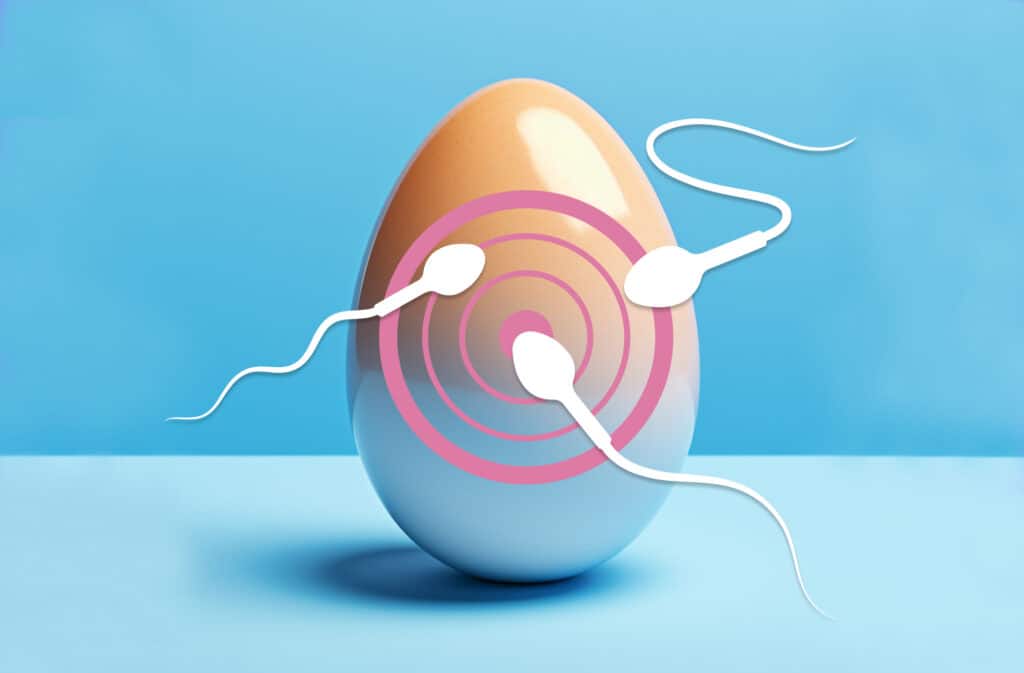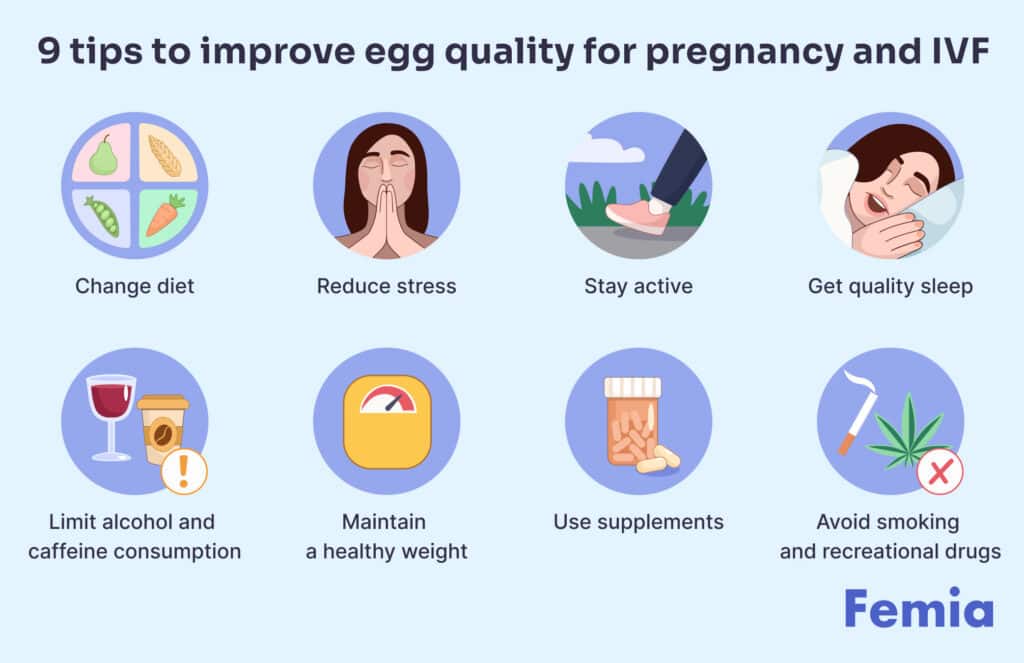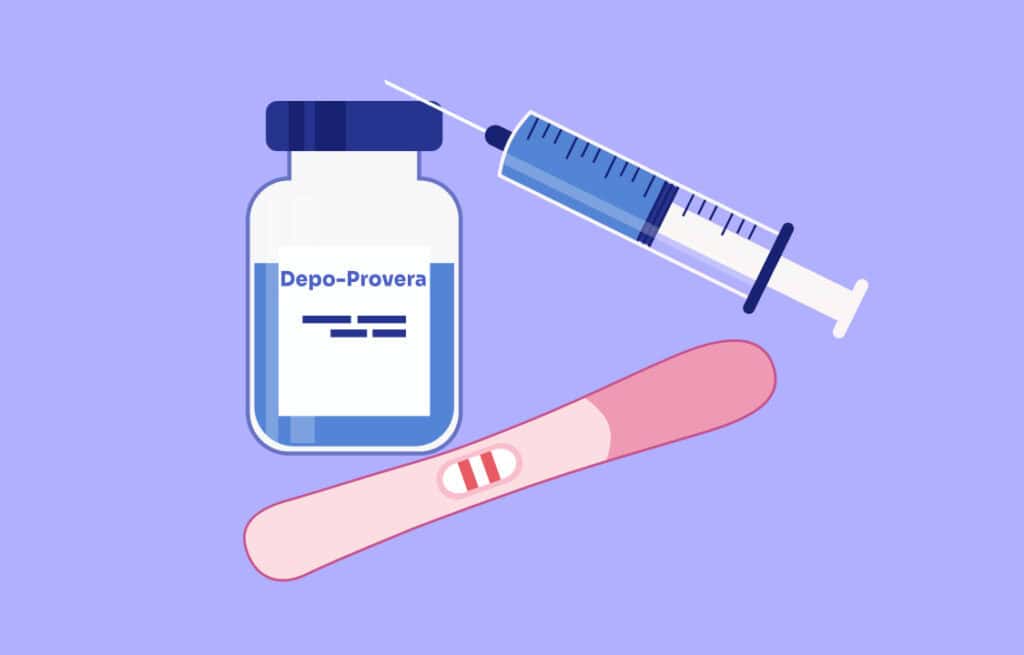Femia > Health Library > Getting Pregnant > Challenges > How to improve egg quality: Tips for boosting fertility at any age
How to improve egg quality: Tips for boosting fertility at any age

- Updated Feb 11, 2025
- Published
CRAFTED BY HUMAN
Crafted by human At Femia, we provide accurate and up-to-date information at every stage of your journey, from trying to conceive, pregnancy and postnatal support. All content is created by a real person based on in-depth research and own professional experience. Femia ensures that you will receive expert advice, strict accuracy and a personalized approach from our authors/medical experts. Learn more about our editorial policy.
FACT CHECKED
Fact checked At Femia Health, we maintain the highest standards of editorial excellence in delivering content focused on helping you conceive, guiding you through pregnancy, and supporting you postpartum. Explore our content review principles to learn how we ensure the accuracy and quality of our health and lifestyle tips for every stage of your journey.

Created with Hector Chapa, MD, FACOG, Clinical associate professor, Obstetrics and Gynecology Texas A&M University, College of Medicine in Bryan-College Station, USA
- Living a healthy lifestyle—eating an antioxidant-rich diet, maintaining a healthy weight, staying active, and reducing exposure to toxins—can help improve your egg quality and boost fertility. You can also considerfertility supplements after consulting your doctor.
- These changes typically take 3–6 months to show effects.
- If you’re over 35 and struggling to conceive, seek medical advice promptly for personalized fertility support.
You probably already know that the number of eggs you have decreases as you age, but did you also know that their quality declines, too? And, when it comes to getting pregnant and having a healthy baby, the quality of your eggs is a big deal.
Knowing what impacts egg quality—and how to improve your egg quality—can help you protect your reproductive health. In this article, we’ll share some practical tips to help you maximize your egg quality, so you can feel confident on your path to motherhood, whenever the time is right for you.
Understanding egg quality
Egg quality is all about how healthy and viable your eggs are, which directly impacts your chances of getting pregnant and having a healthy baby. High-quality (or “normal” or “healthy”) eggs are more likely to be fertilized by a sperm cell and develop into a healthy fetus. On the flip side, less healthy eggs may struggle to be fertilized or attach to the uterus wall and will have a higher chance of miscarriage or complication.
When doctors and scientists talk about “egg quality,” they are talking about whether an egg is genetically normal (euploid) or abnormal (aneuploid). A normal egg has 23 chromosomes (genes) in it; if it has any more or less, then it is abnormal. Abnormal eggs are far less likely to result in pregnancy even if they are fertilized by sperm. But, if an abnormal egg does result in pregnancy, then the chances of miscarriage or having a baby with a genetic disorder like Down syndrome is much higher.
Age is a key factor, but it’s not the only one—your lifestyle, diet, stress levels, and overall health all play a role.
Causes of poor egg quality
- Age: Age is the biggest factor when it comes to egg quality. As your body ages, the chances of something going wrong with it increases, and it’s the same with your eggs. Women are born with all the eggs they’ll ever have, and as we age, the quantity and quality of those eggs goes down. This becomes more noticeable after 35 and picks up speed after 37.
- Lifestyle choices: Your everyday choices play a big role in egg quality, too. Smoking, drinking too much alcohol, eating poorly, or not moving enough can negatively affect your eggs.
- Reproductive disorders: If you suffer from certain reproductive disorders like Polycystic Ovary Syndrome (PCOS), then the quality of your eggs can be affected.
- Environmental influences: The world around us also plays a part. Exposure to things like pollution, heavy metals, or some chemicals like DDT can influence the growth and quality of your eggs.
👉Find out more: Boosting your fertility: Tips for getting pregnant in your 30s
Determining egg quality
When it comes to wanting to know the quality of your eggs, no single test can give you an answer. However, your body can give you some helpful hints about where you stand. Let’s break it down:
Signs of good egg quality:
- Regular periods. The menstrual cycle typically lasts around 28 days, but anywhere from 23 to 35 days is normal. Regular periods are usually a positive sign that your ovaries are releasing eggs and your hormones are in balance. However, it’s not a guarantee; so, even if your periods are regular, it’s still important to discuss any concerns with your healthcare provider.
- Positive fertility test results. If you’ve had fertility tests like an AMH (Anti-Müllerian hormone) or an ultrasound, and the results came back good, that’s another positive sign. These tests look at the number of eggs you have left, and good results generally indicate healthy, viable eggs. However, the American College of Obstetricians and Gynecologists (ACOG) warns that fertility testing results cannot predict how long it will take to get pregnant and shouldn’t be used as a guide for future fertility.
@femia.fertility What do you know about ovarian reserve? How many eggs do you have left before menopause? Knowing this information will help you plan your pregnancy. #eggcount #ovarianreserve #eggquality #ivf #fertility #fertilityjourney #ovulation #menopause #eggsupply #ttccommunity #amhtest ♬ original sound - Femia fertility app
Signs of poor egg quality:
- Irregular periods. If you struggle to predict when your periods will start, it probably means they’re irregular. Irregular cycles can suggest that your hormones are out of sync, which might mean your ovaries are having trouble releasing healthy eggs regularly. If you’re over 40 and notice your periods becoming more irregular, it could be a sign that menopause is approaching. It’s important to discuss any changes in your menstrual cycle with your healthcare provider.
- Difficulty getting pregnant. Struggling to get pregnant despite regular unprotected sex can be a red flag for poor egg quality. If conception isn’t happening, it could mean the eggs being released aren’t healthy enough to be fertilized or to develop into a viable pregnancy. Later on, we’ll discuss when you should speak to your healthcare provider.
- Poor response to fertility tests or treatment. If you suffer from infertility, you might have already had fertility testing or started fertility treatment. The results of these tests and treatments can give you a good idea of the quantity and quality of your eggs.
- Medical conditions. Suffering from certain medical conditions, like PCOS and endometriosis, can impact the quality of your eggs. A 2021 study found that eggs from women with PCOS have genetic differences that can impact how they mature and develop in the ovaries.
It is important to remember that none of these signs guarantee poor egg quality. So, if you’re noticing any of the above signs, don’t panic—the most important thing to do is talk with your healthcare provider. They will take a personalized approach to looking at your fertility and decide what next steps, if any, are needed.
👉Find out more: Thinking about conception? Genetic testing before pregnancy explained
How to improve egg quality for pregnancy and IVF: 9 tips
If you’re trying to get pregnant or are gearing up for IVF, you might be wondering how you can improve your egg quality. While you can’t turn abnormal eggs into normal ones, the good news is that there’s plenty you can do to protect your healthy eggs and optimize your fertility.

Here are nine practical tips to help you get started:
1. Modify your diet
Eating a healthy, balanced fertility diet is not only good for your overall health but also supports your egg health. A poor diet, especially one high in processed foods and sugar, can unbalance your hormones and lead to “oxidative stress.” This causes inflammation in the body that can harm your ovaries and eggs.
Research shows that diet can have a big impact on fertility. A systematic review found that a high-fat diet can impact the quality of your eggs and how they develop. Additionally, a 2023 review discovered that eating too much processed red meat can cause inflammation, harming your eggs.
So, what is the best diet for fertility? A balanced diet, low in refined sugars and processed foods, is the best diet for overall health and fertility. Include antioxidant rich foods like berries, leafy greens, unsalted nuts and seeds, and Omega-3-rich fatty fish to help protect your ovaries and support egg health.
2. Maintain a healthy weight
Maintaining a healthy weight is important for fertility. Research shows that being overweight can affect hormone levels, cause inflammation, and impact egg quality. On the other hand, being underweight can also affect egg quality, with one study finding that women with a BMI under 19 were almost twice as likely to have poor egg quality as women with a healthy BMI.
We understand that managing your weight can be challenging, so if you have any concerns, speaking to your healthcare provider is a great first step. They can offer personalized advice on lifestyle changes and discuss any treatments that might be helpful.
3. Reduce stress
Stress and fertility often go hand in hand. While the research so far has struggled to determine exactly how stress impacts fertility, one large meta-analysis found that couples who managed their stress during fertility treatment had better chances of getting pregnant.
Regardless, finding ways to relax is crucial for your overall health. Whether you unwind through yoga, running, reading fan fiction, or doing puzzles, what matters most is that you take time to prioritize yourself.
4. Stay active
Regular exercise helps maintain a healthy weight, protects against oxidative stress and balances hormone levels—especially if you have PCOS.
Research shows that the fertility benefits of exercise can take time to show and aren’t necessarily tied to how much weight you lose. That’s why it’s crucial to develop a workout routine that you enjoy and can stick with long term. The type of exercise you choose might also make a difference. Resistance training and vigorous aerobic exercise may be especially beneficial for women with PCOS.
Undertaking too much exercise, however, can have the opposite effect—especially for women who have a healthy or low BMI. So, aim for moderate exercise, like walking, swimming, weight training, or cycling, and make sure you’re replacing the calories you’re working off.
5. Limit alcohol
We all know that drinking alcohol during pregnancy can be harmful; however, its effect on fertility is less clear. One study found that alcohol, particularly binge-drinking, is linked to impaired fertility. The same study also revealed that drinking even a small amount of alcohol a week during IVF treatment led to fewer eggs being retrieved.
Cutting out, or at least significantly reducing, your alcohol consumption could help improve egg quality and boost your fertility.
6. Avoid smoking and recreational drugs
Smoking and taking recreational drugs can harm your health and your fertility. One 2023 study found that smoking impacts the quality of your eggs, resulting in more abnormal ones.
7. Prioritize good quality sleep
Research shows that sleep deprivation can impact your hormones and cause oxidative stress, both of which can affect egg quality. Adequate sleep is essential for your body to repair and regenerate, including your eggs. Aim for 7–8 hours of good-quality sleep each night to support your fertility.
8. Consider supplements
Certain supplements like folic acid, CoQ10, DHEA, and melatonin have been shown to support and even improve egg quality.
However, a large systemic review highlighted that while these supplements may improve egg quality, more research is needed to determine the best dosage and treatment duration. Before you start any new supplements, check with your healthcare provider to make sure they’re right for you.
👉Find out more: Enhancing fertility naturally: A guide to fertility supplements and foods for women
9. Explore medical interventions
Depending on your fertility status and age, you could be referred to a reproductive health expert who will help you on your path to motherhood. They may suggest assisted reproductive technology (ART)—for example, IVF. If fertility tests reveal that your egg quality is low and your chances of getting pregnant are minimal, then your doctor may recommend further support, such as using healthy donor eggs, as an option.
Improving egg quality after 35 and 40
Improving egg quality after 35 and 40 can feel challenging, but following the lifestyle steps we have suggested can help protect your healthy eggs and optimize your fertility.
Since there is no exact sign or symptom that will tell you the quality of your eggs, the most important thing to do is to seek advice from a reproductive expert.
The ACOG recommends having an infertility evaluation if you are over 35 and have been unsuccessfully trying for more than six months or if you’re over 40 and would like to get pregnant, even if you haven’t started trying yet. They will be able to discuss various options with you and suggest any supplements that might help.
Timeframe for improvement
When it comes to egg quality and lifestyle changes, it is important to be realistic about what changes you might see and how long they could take. While some changes might start to show within 30 days, significant improvements typically take longer and require consistency.
Short-term improvements (within 30 days): In the first month, your body will begin to respond to positive lifestyle and dietary changes. You might notice improvements in your overall well-being, hormone balance, and energy levels during this time. However, it’s important to remember that egg development is a gradual process, and major changes in egg quality won’t happen overnight.
Longer-term improvements (3 to 6 months): Eggs naturally take about 90 days to mature before they are released during ovulation, so the lifestyle changes you make today can start to influence the eggs that will be released three months from now. During this time, maintaining a balanced diet rich in antioxidants, managing stress, and avoiding harmful substances like alcohol and tobacco are key.
Femia offers personalized insights to help you conceive naturally
When to seek professional help
| Age (ACOG guidance) | |
|---|---|
| Under 35 | Not pregnant after 12 months or more of regular, unprotected sex |
| 35–40 | Not pregnant after 6 months of trying |
| 40+ | As soon as you decide you want to get pregnant |
Questions from Femia community
Are there specific workouts I can do to boost my egg quality?
Moderate regular exercise like swimming, walking, and cycling can help improve overall egg quality. One study also found that if you suffer from PCOS, weight training and vigorous aerobic exercise may be better at improving your egg quality than other forms.
How might toxins in my environment harm my eggs—and what can I do to avoid them?
Yes, certain toxins such as heavy metals, pollution, and chemicals found in certain plastics and pesticides can harm your egg quality. You can minimize your exposure by opting for organic food products, swapping any cleaning products you use with non-toxic alternatives, and reducing the amount of plastic that your food and drink comes into contact with.
Is my egg quality partly genetic? Can I still improve it somehow?
Yes, genetics can play a role in egg quality, as some women may be more predisposed to conditions affecting their eggs. While you can’t change your genetics, there are still ways to support your egg quality. Focus on maintaining a healthy lifestyle, including a balanced diet, regular exercise, and stress management. Additionally, consulting with a fertility specialist can help you explore potential supplements that might be suitable for you.
Could any of my health conditions be impacting the quality of my eggs?
Yes, medical conditions like PCOS and endometriosis can impact egg quality. Speak to your healthcare provider for personalized advice on the best way to manage these conditions and limit their effect on your egg quality.
The bottom line
Improving your egg quality is a marathon, not a sprint. But, taking a holistic approach and starting as soon as possible can make a big difference to the future health of your eggs.
Eating a balanced diet, getting a good night’s sleep, maintaining a healthy weight, and avoiding unhealthy practices like drinking and smoking can not only help you to lead a healthier life but can also improve your egg quality.
Talk to your healthcare provider about the possibility of starting any supplements that might help or if you have any concerns over your fertility.
References
- Akgün, Nilüfer, et al. “The Effect of Dietary Habits on Oocyte/Sperm Quality.” Journal of the Turkish-German Gynecological Association, vol. 24, no. 2, June 2023, pp. 125–37. https://doi.org/10.4274/jtgga.galenos.2023.2022-7-15.
- Broekmans, F. J., et al. “Ovarian Aging: Mechanisms and Clinical Consequences.” Endocrine Reviews, vol. 30, no. 5, July 2009, pp. 465–93. https://doi.org/10.1210/er.2009-0006.
- Brower, M., et al. “The Effect of Low Body Mass Index (BMI) on Ooctye Quality in IVF Cycles.” Fertility and Sterility, vol. 100, no. 3, Sept. 2013, p. S494. https://doi.org/10.1016/j.fertnstert.2013.07.355.
- Chian, Ri‐Cheng, et al. “IVM of Human Immature Oocytes for Infertility Treatment and Fertility Preservation.” Reproductive Medicine and Biology, vol. 22, no. 1, Jan. 2023, https://doi.org/10.1002/rmb2.12524.
- Dai, Mengyang, et al. “Disturbed Follicular Microenvironment in Polycystic Ovary Syndrome: Relationship to Oocyte Quality and Infertility.” Endocrinology, vol. 165, no. 4, Feb. 2024, https://doi.org/10.1210/endocr/bqae023.
- Deng, Langjing, et al. “Mixed Effects of Ambient Air Pollutants on Oocyte-related Outcomes: A Novel Insight From Women Undergoing Assisted Reproductive Technology.” Ecotoxicology and Environmental Safety, vol. 280, July 2024, p. 116525. https://doi.org/10.1016/j.ecoenv.2024.116525.
- “Evaluating Infertility.” ACOG, www.acog.org/womens-health/faqs/evaluating-infertility#:~:text=Experts%20recommend%20an%20infertility%20evaluation,after%206%20months%20of%20trying.
- “Female Age-Related Fertility Decline.” ACOG, www.acog.org/clinical/clinical-guidance/committee-opinion/articles/2014/03/female-age-related-fertility-decline.
- Frederiksen, Yoon, et al. “Efficacy of Psychosocial Interventions for Psychological and Pregnancy Outcomes in Infertile Women and Men: A Systematic Review and Meta-analysis.” BMJ Open, vol. 5, no. 1, Jan. 2015, p. e006592. https://doi.org/10.1136/bmjopen-2014-006592.
- Gonnella, Francesca, et al. “A Systematic Review of the Effects of High-Fat Diet Exposure on Oocyte and Follicular Quality: A Molecular Point of View.” International Journal of Molecular Sciences, vol. 23, no. 16, Aug. 2022, p. 8890. https://doi.org/10.3390/ijms23168890.
- Hart, Roger J. “Physiological Aspects of Female Fertility: Role of the Environment, Modern Lifestyle, and Genetics.” Physiological Reviews, vol. 96, no. 3, July 2016, pp. 873–909. https://doi.org/10.1152/physrev.00023.2015.
- “Impact of Different Typologies of Smoking on Ovarian Reserve and Oocyte Quality in Women Performing ICSI Cycles: An Observational Prospective Study.” European Review for Medical and Pharmacological Sciences, Reproductive Physiopathology and Andrology Unit, Sandro Pertini Hospital, Rome, Italy, 2023, pp. 5190–99. www.europeanreview.org/wp/wp-content/uploads/5190-5199.pdf.
- Lateef, Olubodun Michael, and Michael Olawale Akintubosun. “Sleep and Reproductive Health.” Journal of Circadian Rhythms, vol. 18, no. 1, Jan. 2020, https://doi.org/10.5334/jcr.190.
- Lemseffer, Yassir, et al. “Methods for Assessing Oocyte Quality: A Review of Literature.” Biomedicines, vol. 10, no. 9, Sept. 2022, p. 2184. https://doi.org/10.3390/biomedicines10092184.
- Li, Jie, et al. “Molecular Features of Polycystic Ovary Syndrome Revealed by Transcriptome Analysis of Oocytes and Cumulus Cells.” Frontiers in Cell and Developmental Biology, vol. 9, Sept. 2021, https://doi.org/10.3389/fcell.2021.735684.
- Luo, Yun-Yao, et al. “Editorial: Aging and the Oocyte.” Frontiers in Endocrinology, vol. 15, Jan. 2024, https://doi.org/10.3389/fendo.2024.1361115.
- Miglietta, Selenia, et al. “Heavy Metals in Follicular Fluid Affect the Ultrastructure of the Human Mature Cumulus-Oocyte Complex.” Cells, vol. 12, no. 21, Nov. 2023, p. 2577. https://doi.org/10.3390/cells12212577.
- Mussawar, Minhal, et al. “The Effect of Physical Activity on Fertility: A Mini-review.” F&S Reports, vol. 4, no. 2, June 2023, pp. 150–58. https://doi.org/10.1016/j.xfre.2023.04.005.
- Purcell, Scott H., and Kelle H. Moley. “The Impact of Obesity on Egg Quality.” Journal of Assisted Reproduction and Genetics, vol. 28, no. 6, May 2011, pp. 517–24. https://doi.org/10.1007/s10815-011-9592-y.
- Rodríguez-Varela, Cristina, et al. “Clinical Application of Antioxidants to Improve Human Oocyte Mitochondrial Function: A Review.” Antioxidants, vol. 9, Nov. 2020, p. 1197. https://doi.org/10.3390/antiox9121197.
- Shi, Yu-Qian, et al. “Premature Ovarian Insufficiency: A Review on the Role of Oxidative Stress and the Application of Antioxidants.” Frontiers in Endocrinology, vol. 14, Aug. 2023, https://doi.org/10.3389/fendo.2023.1172481.
- Trop-Steinberg, Shivtia, et al. “Effect of Omega-3 Supplements or Diets on Fertility in Women: A Meta-analysis.” Heliyon, vol. 10, no. 8, Apr. 2024, p. e29324. https://doi.org/10.1016/j.heliyon.2024.e29324.
- “The Use of Antimüllerian Hormone in Women Not Seeking Fertility Care.” ACOG, www.acog.org/clinical/clinical-guidance/committee-opinion/articles/2019/04/the-use-of-antimullerian-hormone-in-women-not-seeking-fertility-care.
- Van Heertum, Kristin, and Brooke Rossi. “Alcohol and Fertility: How Much Is Too Much?” Fertility Research and Practice, vol. 3, no. 1, July 2017, https://doi.org/10.1186/s40738-017-0037-x.
- Website, Nhs. “Periods and Fertility in the Menstrual Cycle.” nhs.uk, 20 May 2024, www.nhs.uk/conditions/periods/fertility-in-the-menstrual-cycle/#:~:text=The%20length%20of%20the%20menstrual,day%20before%20her%20next%20period.

Discover 10 signs of pregnancy while breastfeeding. Learn about changes in milk supply, fatigue, and other symptoms. Expert advice for new moms from Femia.

Learn the ultimate guide to female orgasm with the orgasm tips, tricks, techniques, and do’s and don’ts to achieve the most satisfying sex experience!

Learn about the signs of pregnancy after Depo-Provera, how long it takes to get pregnant, and tips for conceiving after stopping the birth control shot.
